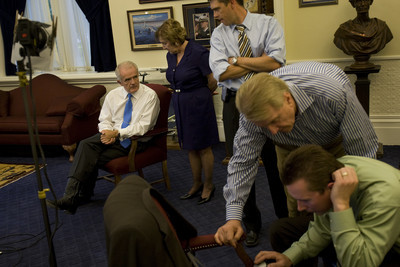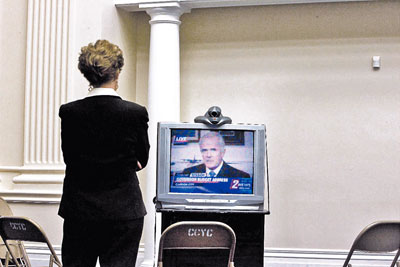$275 million more cuts
CARSON CITY -- Without much, if any, input from Gov. Jim Gibbons, legislative leaders reached a bipartisan agreement Thursday evening on a plan to cut state spending by $275 million.
With agreement from the governor, the deal could allow the Legislature to quickly address the budget shortfall and conclude a three-day special session beginning at 10 a.m. today.
Gibbons' proposals to address the shortfall are led by a 4 percent across-the-board cut to state agencies except education and human resources.
Gibbons said he does not agree with all details of the legislators' plan. In particular, he opposes taking $45 million set aside for new textbooks.
Lawmakers did not release details of their entire plan, which calls for budget cuts of 3 percent among other things. But many items in the legislators' agreement were advanced by Gibbons as possible ways to address the shortfall, according to Senate Majority Leader Bill Raggio, R-Reno.
The governor, who delivered a 10-minute televised speech Thursday evening on the state revenue shortfall, would not say whether he was willing to compromise on the textbook issue or other planned cuts. Gibbons said he and his staff had spoken with some legislative leaders and were aware of their proposals.
"We are at a sensitive negotiation phase between the Legislature and the administration," Gibbons said following his speech. "Let me not jeopardize it by letting the cat out of the bag before tomorrow morning."
Gibbons repeated his vow to veto any bills coming out of the special session that would increase taxes. He noted that Winston Churchill once said: "A nation trying to lift itself into prosperity by raising taxes is like a man standing in a bucket trying to lift himself up by the handle."
Assembly Speaker Barbara Buckley, D-Las Vegas, delivered a 10-minute televised speech following Gibbons' remarks and took aim at the governor.
"I have to tell you that I have felt incredibly frustrated by the governor's lack of collaboration with the Legislature," said Buckley, widely seen as a possible Democratic candidate for governor in 2010.
"The last I heard from the governor was June 12, when he advised me he absolutely would not call a special session," she said.
The following day, Gibbons reversed himself and called the Legislature into session.
Senate Majority Leader Bill Raggio, R-Reno, said it was "not helpful" to criticize Gibbons, particularly since legislators want him to agree to their budget-cutting plan.
In his address, Gibbons called on legislators to cut state agency spending by 4 percent, or $128 million, but to limit cuts to education and human resources programs.
"He is talking higher. That would cause serious problems," Raggio said, of the difference between Gibbons' call for 4 percent cuts and lawmakers' approval of 3 percent cuts.
Raggio said he disagreed with Gibbons' comments during his speech that the state had "overpromised" by approving raises, new services and other spending increases. Gibbons said the Legislature must adopt a new spending cap.
"We approved spending in the same amount that the governor set in his budget," Raggio said.
Gibbons noted he and the Legislature passed a two-year budget in 2007 that was $1 billion more than the previous budget. Because of declining state revenue, the governor and legislators already have made $914 million in cuts in the state's two-year budget that ends June 30, 2009.
That shortfall now has reached $1.2 billion, counting the additional $275 million in cuts that will be made at the special session.
Gibbons said he will propose a no-growth in spending budget when the Legislature convenes in its regular session in February to set a spending plan for the 2009-2011.
Assembly Minority Leader Heidi Gansert, R-Reno, said she was confident Gibbons will support the legislators' budget-cutting plan, including the textbook reductions.
"I believe the governor will be on board," Gansert said. "We have been working for days and days to come to a resolution. I appreciate everyone worked together in a bipartisan manner."
Legislators and Gibbons agreed Thursday that no attempt will be made in the special session to delay a 4 percent cost-of-living pay increase for state employees and teachers next Tuesday.
"In a time when we're struggling to recruit and retain top-notch teachers for our children, it wouldn't be responsible to go back on our promise to them, and I can't in good conscience recommend doing that," Gibbons said.
Buckley backed Gibbons on his move to keep the cost-of-living adjustments.
"I'm very glad the governor agreed with Assembly Democrats in not taking away the cost-of-living increases."
A delay "would have hurt our teachers at a time they are struggling with the rising cost of fuel and groceries and would have sent the wrong message. And, quite frankly, they are underpaid now."
Buckley said the same holds true for state workers, who are doing more work because of a hiring freeze, keeping many positions vacant.
Nevada State Education Association President Lynne Warne praised Buckley, Raggio and Gibbons for not delaying the cost of living increase.
School district officials proposed the $45 million cut in textbook funds as an alternative to cutting the COLAs, Buckley said.
If tax revenues grow by more than has been projected, then none of the textbook money would be touched at all, Buckley said.
Contact Review-Journal Capital Bureau chief Ed Vogel at evogel@reviewjournal.com or 775- 687-3901. Contact Capital Bureau reporter Sean Whaley at swhaley@reviewjournal.com or 775- 687-3900.
SOME POINTS Gov. Jim Gibbons said he would detail a 21-point plan for dealing with the state budget shortfall, but offered only a half-dozen ideas in his Thursday speech. Among them: • Tapping the $267 million rainy day fund now, rather than in February. • Saving $128 million by cutting state agency budgets by 4 percent, while sparing education and human resources. • Delaying $45 million in highway projects. • Taking $27 million in a public health trust fund. • Using $7.6 million in additional unclaimed property receipts. • Taking $4 million from a disaster relief fund. • Securing an additional $3 million from a tax amnesty program. • Leaving intact cost-of-living raises for state employees, teachers and university personnel that would save $130 million. On the WebRead the text of Gibbons' speech on the eve of the special session (.pdf)























